In the News | 2022
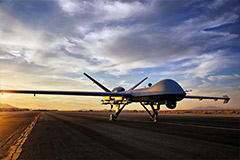 |
In the NewsDecember 24, 2022Defense firms accelerate anti-UAV tech as cheap but effective combat drones wreak havoc in UkrainePrakash NandaThe Eurasian TimesQuoted: "As Prof. Erik Lin-Greenberg of the Massachusetts Institute of Technology points out, it is virtually a sellers’ market for drones today. So much so that Iran has established drone production lines in Tajikistan and Venezuela, and Turkey plans to build a TB2 factory in Ukraine." |
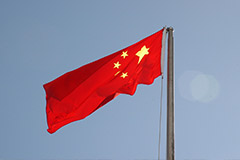 |
In the NewsDecember 14, 2022Beyond China’s COVID unrest, 3 important economic takeawaysBetsy VereckeyMIT SloanChina’s strict “zero-COVID” strategy has complicated the country’s economic recovery. A panel of experts explores three social and economic costs of President Xi’s policies. |
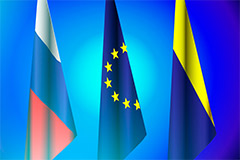 |
In the NewsDecember 13, 2022Energy, war, and the crisis in UkrainePeter DizikesMIT NewsAn expert panel examines the implications of energy use and energy policy during Russia’s invasion. |
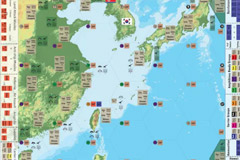 |
In the NewsDecember 10, 2022As many as 10,000 Yanks could perish in battle of Taiwan, war game suggestsC.M. VikThe SunQuoted: "It is difficult to overstate “how much of a shock this would be to the United States,” an MIT researcher and participant in the war game, Eric Heginbotham, says. “We have not fought a war like this since 1945 and the scale of the losses would be beyond anything we’ve experienced for generations. The military has been quite accustomed to operating in sanctuary, particularly the Air Force and the Navy.” |
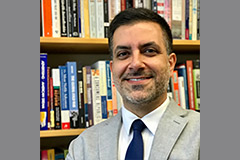 |
In the NewsDecember 6, 2022Q&A: Pouya Alimagham on the protest movement in IranMichelle EnglishMIT NewsWomen and girls are at the forefront of the uprising, which is rooted in Iranians’ long struggle for freedom, notes Pouya Alimagham, MIT History lecturer and historian of the modern Middle East. |
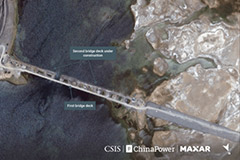 |
In the NewsNovember 29, 2022China built new military post near disputed Indian border, satellite images showAlexander Ward and Matt BergPoliticoQuoted: "This appears consistent with China’s efforts to improve infrastructure near the LAC in the eastern section. There are many other similar weapons emplacements in other locations, where China is clearly digging in for long-term, all-season presence and to have the means to react to any contingency,” said M. TAYLOR FRAVEL, an expert on China’s military and director of the security studies program at MIT. |
 |
In the NewsNovember 21, 2022Machinery of the stateLeda ZimmermanMIT NewsAssociate Professor Mai Hassan documents bureaucratic systems in Eastern Africa set up for coercion, as well as roadblocks to democratic government. |
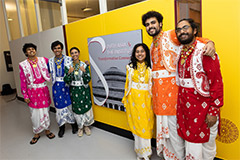 |
In the NewsNovember 18, 2022Uncovering the rich connections between South Asia and MITZach WinnMIT NewsShowcased in a new exhibit, student research explores the long history of South Asians at the Institute. |
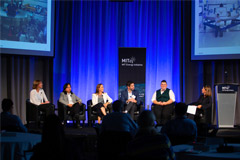 |
In the NewsNovember 9, 2022Advancing the energy transition amidst global crisesLeda ZimmermanMIT NewsQuoted: “Although the United States and China working together would have huge effects for both countries, it is politically unpalatable in the short term,” said Taylor Fravel, the Arthur and Ruth Sloan Professor of Political Science and director of the MIT Security Studies Program. |
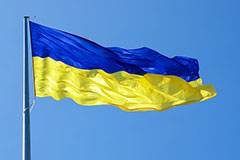 |
In the NewsOctober 11, 2022Where Russia’s invasion of Ukraine standsPeter DizikesMIT NewsWhile the early months of the war saw significant Russian advances in multiple areas of Ukraine, the tide has turned since then. A recent Ukrainian counteroffensive in the country’s north has pushed Russian troops back across the border and has extended to provinces in the Donbas region, the site of much industrial activity. Over the last week, Ukraine has also taken back 150 square miles of land in the Kherson province in the country’s south. |
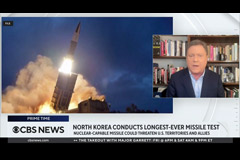 |
In the NewsOctober 4, 2022North Korea launches nuclear-capable missile over JapanJohn DickersonCBS NewsFor the first time in five years, North Korea launched a missile over Japan Tuesday, rattling nerves and sending a message to the US and its allies. Jim Walsh, senior research associate with the MIT Security Studies Program, spoke with John Dickerson explored the implications of this launch. |
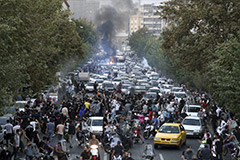 |
In the NewsSeptember 26, 2022Protests, political unrest and violent clashes plague IranRobin YoungWBURHere & Now's security analyst Jim Walsh was at the UNGA and speaks to Robin Young about the latest news on Iran. |
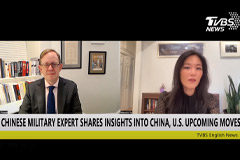 |
In the NewsSeptember 21, 2022Taylor Fravel shares insights into China, Taiwan, and US upcoming moves with Wenchi YuWenchi YuTVBS English NewsTaylor Fravel speaks on TVBS News with Wenchi Yu on the upcoming moves of China, the US, and Taiwan. |
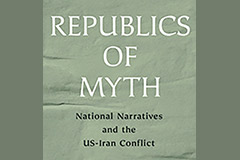 |
In the NewsSeptember 20, 2022The US-Iran conflict: Review of “Republics of Myth”Marc Martorell JunyentInformed CommentMarc Martorell Junyent reviews Republics of Myth: National Narratives and the US-Iran Conflict by Hussein Banai, Malcolm Byrne, and John Tirman. In memory of John Tirman, who passed away suddenly on Friday, August 19, 2022. Read the obituary and tributes. |
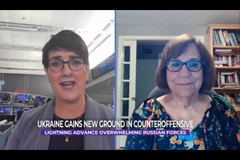 |
In the NewsSeptember 14, 2022Ukraine gaining ground over Russian troopsSue O'ConnellNECNSue O’Connell talks to Carol Saivetz about Russian President Vladimir Putin’s reaction to the news that his troops are losing ground. |
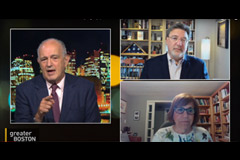 |
In the NewsSeptember 12, 2022‘This war isn’t even close to over’: Ukrainian advances spring hope, but not victoryJim BraudeGBH NewsA massive counteroffensive by Ukrainian forces has forced Russian troops to retreat in several key cities in Ukraine’s Kharkiv region. Tom Nichols, international affairs expert and staff writer with The Atlantic, and Carol Saivetz, senior advisor for MIT’s Security Studies program, joined Jim Braude to discuss why this victory doesn’t signal an end to the war and the only person who can decide when this war is over is President Vladmir Putin. |
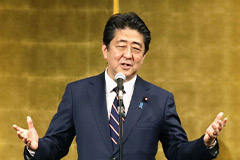 |
In the NewsSeptember 10, 2022The Abe legacy: a Japan empowered by far-reaching reformsPeter TaskerJapan ForwardQuoted: "In his fascinating book Special Duty: A History of the Japanese Intelligence Community, Professor Richard Samuels of the Massachusetts Institute of Technology puts it like this: 'For decades after the war, Japan had no centralized intelligence capacity…. It was not until Prime Minister Abe’s reengineering project — including creation of a centralized NSC (National Security Council) in 2013 and its intelligence coordinating unit, the National Security Secretariat — that the government acted on its oft-stated determination to upgrade Japan’s intelligence capacity.'" |
 |
In the NewsSeptember 9, 2022Jung Jae Kwon: Questioning the nuclear umbrellaLeda ZimmermanDepartment of Political ScienceDissatisfied with security guarantees from the US, America’s junior allies want greater control over their own defenses. A profile of PhD student Jung Jae Kwon. |
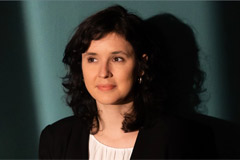 |
In the NewsSeptember 7, 2022Journalism for change drives Brazilian reporter PessoaEsther SunVoice of America2023 Elizabeth Neuffer Fellow Gabriela Sa Pessoa was interviewed in Voice of America about her work and the critical issues of our time. |
 |
In the NewsSeptember 2, 2022Deep inside busy Mar-a-Lago, a storage room where secrets were stashedRosalind S Helderman and Josh DawseyThe Washington PostQuoted: "I think Mar-a-Lago is a counterintelligence nightmare," said Joel Brenner, former head of U.S. counterintelligence under the director of National Intelligence and former inspector general for the National Security Agency, citing the flow of hundreds of people, the presence of foreign nationals and Trump's long-established carelessness with national secrets. |
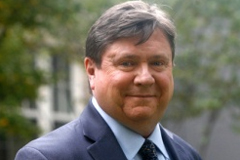 |
In the NewsAugust 30, 2022North Korea will conduct another nuclear test. It's only a matter of when.Robert ElderOutriderAlthough delayed by the Covid pandemic, North Korea is poised to start testing its nuclear weapons program, says Jim Walsh, a senior research associate at MIT’s Security Studies Program. “Most analysts who work on North Korea's nuclear program expect a test, as a matter of ‘when’ not ‘if,” Walsh says. Read the full interview. |
 |
In the NewsAugust 29, 2022Tipping the balance between global rivalsLeda ZimmermanMIT NewsJohn David Minnich seeks to understand how trade policies fueled China’s rise and continue to determine geopolitical winners and losers. |
 |
In the NewsAugust 29, 2022South Africa since apartheid: Has democracy worked?Ray SuarezWorld AffairsIt’s been nearly thirty years since the fall of apartheid in South Africa. But what happens when the celebrations cease, the news cameras turn away, and the real work of democracy begins? Evan Lieberman joins Voice of America’s “Straight Africa Talk” host, Haydé Adams, to discuss the lingering “ghost of apartheid,” and why South Africa’s electoral future gives him hope. |
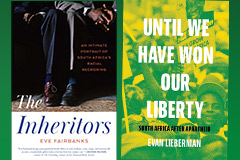 |
In the NewsAugust 26, 2022Two new books take different roads to understand South AfricaCarolyn E HolmesThe Washington PostCarolyn Holmes reviews Until We Have Won Our Liberty: South Africa after Apartheid by Evan Lieberman and The Inheritors: An Intimate Portrait of South Africa's Racial Awakening by Eve Fairbanks. |
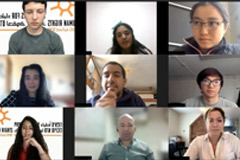 |
In the NewsAugust 25, 2022Promoting systemic change in the Middle East, the 'MIT way'MISTIMIT NewsIn a recent MISTI course, students engaged on collaborative solutions to climate, health care, and economic development in the Middle East. |
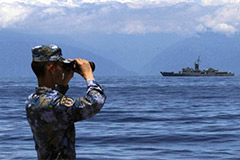 |
In the NewsAugust 22, 2022Panel: ‘Protracted’ Taiwan Crisis Will ‘Percolate for Months'John GradyUSNI NewsM Taylor Fravel and Christopher Twomey, alumnus of MIT Political Science, participate in a panel on the military dimensions of the Fourth Taiwan Strait Crisis, hosted by CSIS. |
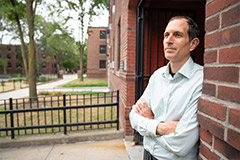 |
In the NewsAugust 14, 2022Power, laws, and planningPeter DizikesMIT News OfficeMIT urbanist Justin Steil studies how law and policy are used to replicate social divisions in the use of land. |
 |
In the NewsAugust 14, 2022International security expert on the threat of Iran plotting to kill Americans on US soilFox News LiveFox NewsMIT security studies program's Jim Walsh reacts to officials of the National Council of Resistance of Iran being targeted by Tehran for their anti-regime activism on Fox News Live. |
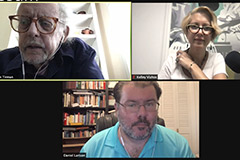 |
In the NewsAugust 12, 2022"Why do they hate us?": John Tirman on the dueling myths keeping Iran and the US from getting togetherKelley Vlahos and Daniel LarisonCrashing the War PartyJohn Tirman joins the Crashing the War Party podcast to dicuss US-Iran relations. |
 |
In the NewsAugust 8, 2022China ends series of live fire military drills around the island of TaiwanEmily FengNPRChina says some of the live-fire military exercises in the waters around the island of Taiwan, which were supposed to end last Sunday, will now continue on a regular basis. So far, the drills have disrupted traffic in what's normally a busy international transit point, highlighting how important geopolitically Taiwan is. Taylor Fravel joins NPR to discuss the consequences. |
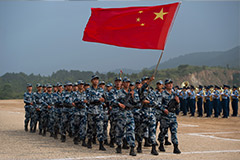 |
In the NewsAugust 8, 2022What-if DC war game maps huge toll of a future US-China war over TaiwanTony CapaccioBloombergQuoted: As China waged extensive military exercises off of Taiwan last week, a group of American defense experts (including CIS principal research scientist Eric Heginbotham and recent MIT PhD graduate Mark Cancian) in Washington was focused on their own simulation of an eventual — but for now entirely hypothetical — US-China war over the island. “The results are showing that under most—though not all—scenarios, Taiwan can repel an invasion,” said Cancian, now a senior adviser at the Center for Strategic and International Studies, where the war games are being held. “However, the cost will be very high to the Taiwanese infrastructure and economy and to US forces in the Pacific,” he said. “Taiwan is a large island, and its army is not small,” said Heginbotham. “But from a qualitative standpoint, Taiwan’s army is not at all what it should be, and we have built that into the game. The transition to an all-volunteer military has been botched, and although conscripts remain an important component, the conscripts serve only four months.” |
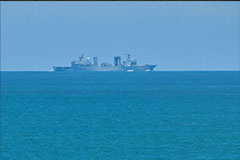 |
In the NewsAugust 7, 2022China’s military exercises showcase modern fighting force preparing for possible war in the Taiwan StraitAlastair Gale and Nancy A YoussefThe Wall Street JournalQuoted: “The ability to conduct joint operations around Taiwan has been a driver of China’s military strategy and force modernization for more than two decades,” [M Taylor] Fravel said. “We should not be surprised by what the PLA is doing, how it is doing it or what it has accomplished.” |
 |
In the NewsAugust 4, 2022What China wants from these war-gamesOmar DuwajiThe WorldChinese officials warned that there would be a response if Nancy Pelosi visited Taiwan. But what does Beijing want from these military maneuvers near the island of Taiwan? Host Marco Werman speaks with Taylor Fravel from the Massachusetts Institute of Technology’s Security Studies Program. |
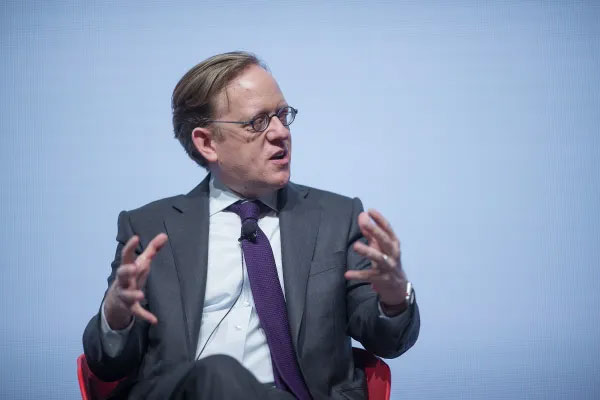 |
In the NewsAugust 4, 2022China's show of force & fury: Military drills encircling Taiwan, explainedLizzi LeeSupChinaTaylor Fravel analyzes the significance of the ongoing military drills surrounding Taiwan launched by PLA. Fravel explains the transformation the PLA has undergone since the 1990s, and how that change could potentially change Xi Jinping's strategic calculus on Taiwan.
|
 |
In the NewsAugust 2, 2022Forceful China response to Pelosi could backfireChou Shih-wei and Ken ChaoFocus TaiwanQuoted: "US-based China researcher M Taylor Fravel said Monday that a forceful show by Beijing in response to a reported visit to Taiwan by US House of Representatives Speaker Nancy Pelosi could backfire. Fravel, a political science professor at the Massachusetts Institute of Technology, said on Twitter that with the People's Liberation Army approaching the peak of its annual training, China will likely convey its discontent with live-fire exercises in a larger scale, and even with incursions across the median line of Taiwan Strait for days if not weeks." |
 |
In the NewsJuly 25, 2022War in Ukraine entering sixth monthSue O'ConnellNECNSue O’Connell spoke with Carol Saivetz from the MIT Security Studies Program about a new deal struck to resume grain exports and worries over Russian gas supplies as the war enters its sixth month. |
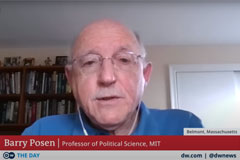 |
In the NewsJuly 11, 2022Ukraine war: Is Russian defeat nothing but a 'fantasy'?Barry R PosenDW NewsBarry R Posen, Ford International Professor of Political Science at MIT, speaks on DW News about the Ukraine war and his analysis of possible outcomes. |
In the NewsJuly 10, 2022What the world can learn from South AfricaDavid GoodmanVTDigger“At this time when the idea of democracy is under assault, South Africa shows us that (democracy) is still a really promising and probably our best political solution, particularly in diverse societies,” says Evan Lieberman in a recent interview. Lieberman offers a fresh take on South Africa’s journey to democracy in his new book, "Until we have won liberty: South Africa after apartheid." |
|
 |
In the NewsJuly 8, 2022Shinzo Abe’s influence was still evident long after he left officeDavid E SangerThe New York TimesQuoted: “We didn’t know what we were going to get when Abe came to office with this hard nationalist reputation,” said Richard Samuels, the director of the Center for International Studies at MIT and the author of books on Japan’s military and intelligence capabilities. “What we got was a pragmatic realist who understood the limits of Japan’s power, and who knew it wasn’t going to be able to balance China’s rise on its own. So he designed a new system.” |
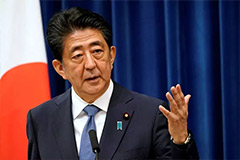 |
In the NewsJuly 8, 2022Why Shinzo Abe was such a towering figure in JapanTobias BurnsThe HillQuoted: Abe “sought to shift the center of gravity in Japanese political culture away from the pacifism that characterized most of the early to mid post-war period to a place that was, in his view, more normal,” Richard Samuels, a political scientist and Japanologist at the Massachusetts Institute of Technology, said in an interview, speaking from Berlin. |
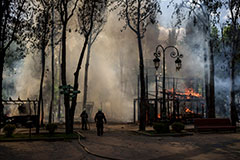 |
In the NewsJune 21, 2022As war drags on in Ukraine, is it time to talk compromise?WBUR On Point"What is the US interest commensurate with the possibility of nuclear escalation?" Steven Simon, a Robert E Wilhelm Fellow at CIS, asks. "There really isn't one." As war drags on, is it time to talk compromise? Tune in to this edition of On Point featuring Simon, Anne Applebaum (The Atlantic), and Ivanna Klympush-Tsintsadze (Ukrainian Parliament from the opposition European Solidarity Party). |
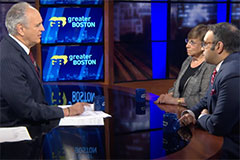 |
In the NewsJune 13, 2022Could Trump’s hostility toward NATO allies be a winning strategy at home?Jim BraudeWGBH Greater BostonEven as it seems Trump's claims are untrue, could they be a winning strategy here at home? And what lies ahead for his London trip and meeting with Russian president Vladimir Putin? Jim Braude was joined by Carol Saivetz, senior adviser at MIT's Security Studies Program and Gautam Mukunda, a Harvard Kennedy School fellow, member of the Council on Foreign Relations, and author of “Indispensable: When Leaders Really Matter.” |
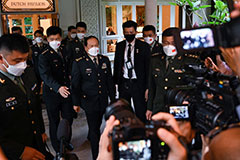 |
In the NewsJune 11, 2022Shangri-La Dialogue opens in SingaporeAnand NaidooThe HeatDescribed as Asia’s premier security summit, military officials and diplomats from more than 40 countries met in Singapore for the Shangri-La Dialogue. On Friday, a highly anticipated meeting took place between the Defense Ministers of China and the United States. Jim Walsh weighs in. |
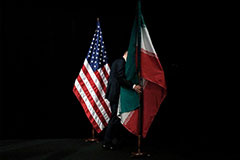 |
In the NewsJune 9, 2022America’s Iran folliesMichael HirshForeign PolicyAfter more than two decades of failed policies—fluctuating wildly between confrontation and cooperation—Washington and the West still find themselves facing down a hostile Iran. And today, though it is in dire shape economically, Tehran may be close to delivering the final rebuff, with experts saying it is just weeks away from achieving nuclear bomb capability. |
 |
In the NewsJune 7, 2022Evan Lieberman on South Africa. Democracy in hard placesJustin KempfDemocracy ParadoxWhen you hear people talk in such disparaging tones, that everything is broken, that nothing is possible, you need to ask yourself, is that right? When you look around, the answer is no, explains Evan Lieberman. |
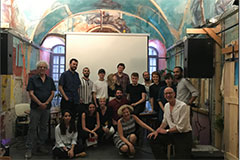 |
In the NewsJune 6, 2022Mobilizing across borders to address global challengesMISTIMIT NewsFor the most creative minds to work together to solve the world’s greatest challenges, it is essential for global collaboration to be unencumbered by distance. The MIT International Science and Technology Initiatives (MISTI) Global Seed Funds (GSF) program enables participating faculty teams to collaborate across borders with international partners to develop and launch joint research projects. |
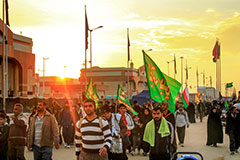 |
In the NewsJune 3, 2022When politics is local in the Middle EastPeter DizikesMIT NewsA recent study led by Fotini Christia suggests sectarian identity in the region is tied to domestic matters, not a larger, transnational religious split. |
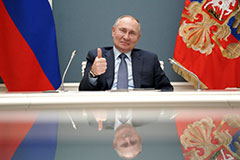 |
In the NewsJune 3, 2022Sanctioned behaviorWar on the RocksCIS research affiliate Erik Sand is featured on War on the Rocks' podcast Horns of Dilemma to discuss the impact of economic sanctions on Russia and whether they will lead to an end of the war in Ukraine. Listen to the podcast here. |
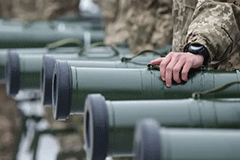 |
In the NewsJune 2, 2022Biden's move to send advanced weapons to Ukraine raises questions about US involvement in the warPeter O'DowdWBURPresident Biden's announcement that the US would send advanced rocket launchers to Ukraine was welcome news for soldiers fighting off the Russian invasion. But it raises new questions about American involvement in a brutal war with no diplomatic end in sight. Jim Walsh provides his analysis. |
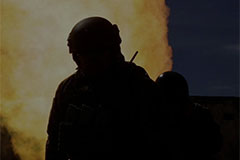 |
In the NewsJune 1, 2022Will the transfer of advanced weapons to Ukraine lead to a widening war?PBS NewsHourThe US and Germany on Tuesday moved to send advanced weapons to Ukraine to blunt a Russian offensive in the east. Steven Simon, who worked on the National Security Council staff during the Clinton and Obama administrations and a Wilhelm Fellow at CIS joined Nick Schifrin to discuss the transfer of arms and the importance of diplomacy. |
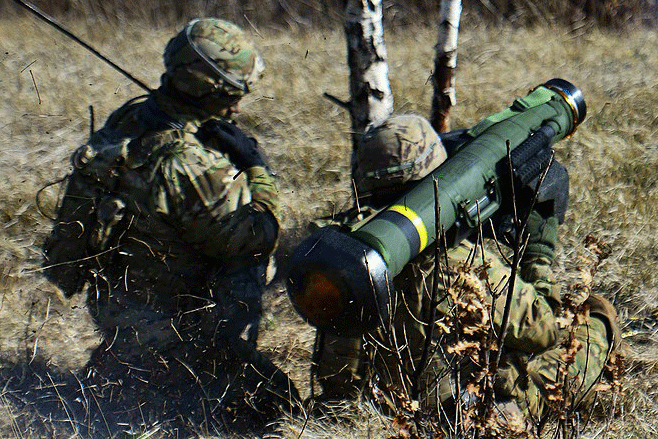 |
In the NewsMay 27, 2022Javelin missiles are in short supply and restocking them won't be easyNPR Morning EditionUkrainian fighters have destroyed Russian fighting vehicles with US supplied Javelins. But replacing the thousands of missiles could take years, largely because of a crimp in the supply chain, argues CIS research affiliate Eugene Gholz. |
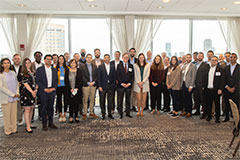 |
In the NewsMay 26, 2022Congressional seminar introduces MIT faculty to 30 Washington staffersSSPMIT NewsMore than 30 congressional and executive branch staffers were hosted by MIT’s Security Studies Program (SSP) for a series of panels and a keynote address focused on contemporary national security issues. |
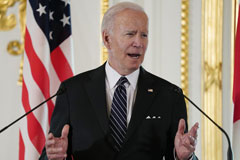 |
In the NewsMay 23, 2022Biden’s Taiwan defense pledge inflames US-China relationsPhelim KinePoliticoQuoted: “A question that must be on everyone’s mind in Beijing is whether the US has already changed its [Taiwan] policy. After all, no one speaks with more authority on questions of foreign policy than the president,” said M Taylor Fravel, director of the Security Studies Program at the Massachusetts Institute of Technology. “[Biden’s] repeated gaffes may be given more weight in Beijing than subsequent clarifications of denials of [policy] change.” |
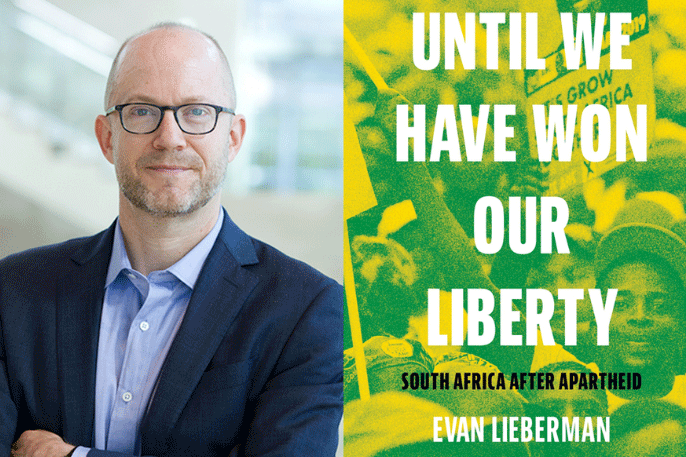 |
In the NewsMay 19, 2022From South Africa, a success story for democracyPeter DizikesMIT NewsIn a new book, MIT political scientist Evan Lieberman examines a quarter-century of post-Apartheid government and finds meaningful progress. |
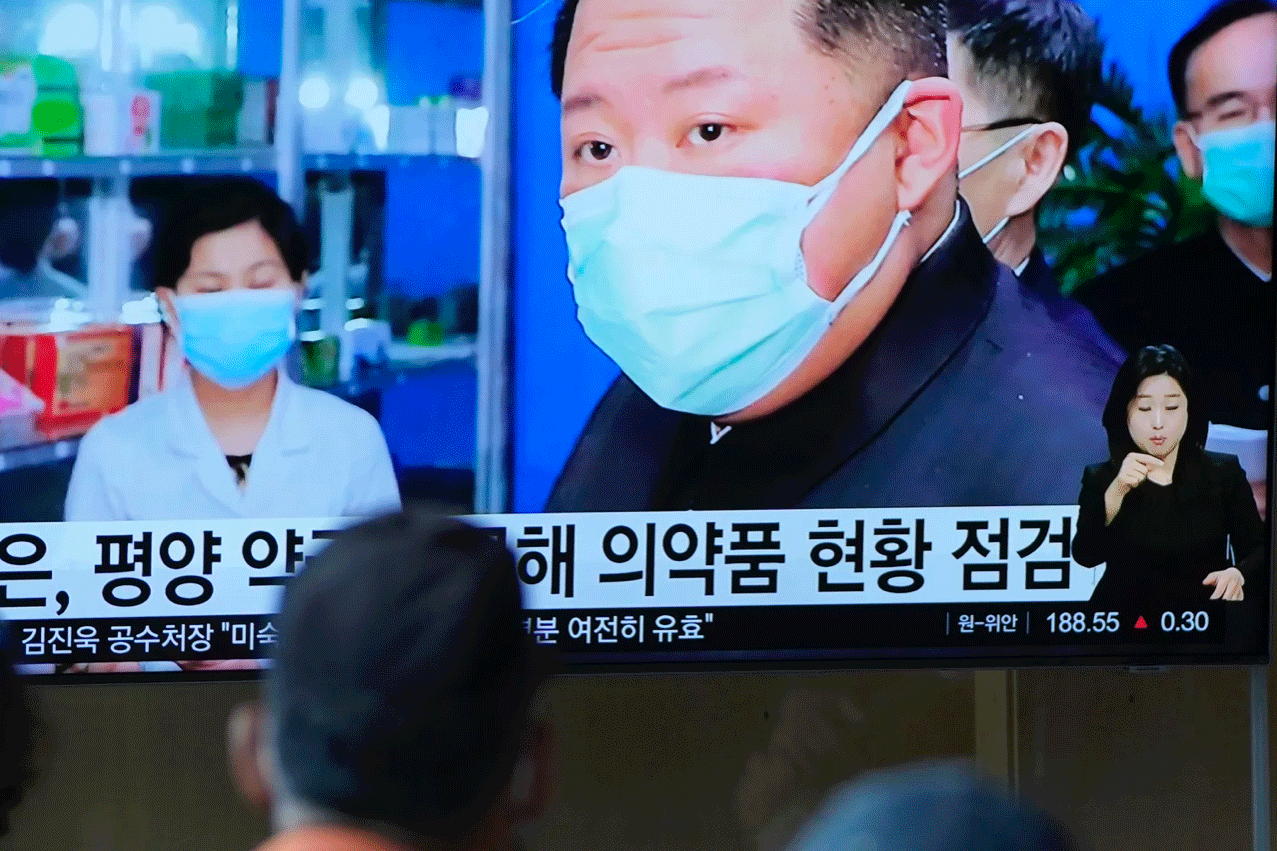 |
In the NewsMay 19, 2022North Korea prepares nuclear test as COVID-19 rips through countryNorth Korea is in the throes of what it calls its first-ever outbreak of COVID-19—even if officially it's avoiding that term. State media said Wednesday that more than 1.7 million people had experienced fevers and 62 people had died since late April, but those numbers are impossible to confirm. And amid the outbreak, North Korea is also gearing up for a possible nuclear test. |
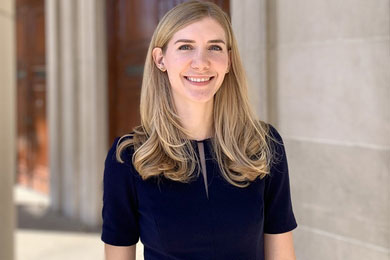 |
In the NewsMay 17, 2022Eleanor Freund receives Jeanne Guillemin PrizeMichelle EnglishMIT News OfficeEleanor Freund, a PhD candidate in the MIT Department of Political Science, is the recipient of this year’s Jeanne Guillemin Prize at the MIT Center for International Studies (CIS). The annual prize supports women pursuing doctorate degrees in international relations—a field that has long been dominated by men. |
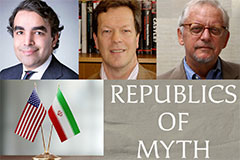 |
In the NewsMay 16, 2022When dueling narratives deepen a dividePeter DizikesMIT News OfficeThe book, “Republics of Myth: National Narratives and the US-Iran Conflict,” just published by Johns Hopkins University Press, explores the joint history of identities at odds with each other. The authors identify key moments when US-Iran tensions became further heightened and opportunities for détente dwindled. |
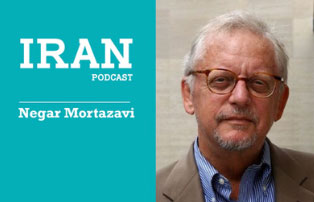 |
In the NewsMay 7, 2022US-Iran tensions and misperceptionsNegar MortazaviIran PodcastJohn Tirman joins Iran Podcast host Negar Mortazavi for a conversation about US-Iran tensions and misperception. |
![Russian service members drive a tank along a street during a rehearsal for the Victory Day military parade in Moscow, May 4, 2022 [Evgenia Novozhenina/Reuters]](https://cis-mit-edu.ezproxy.canberra.edu.au/sites/default/files/images/News_InTheNews_050622_RussiaVictoryDay.jpg) |
In the NewsMay 6, 2022Russia: What is Victory Day, and why is it important this May 9?Niko VorobyovAl JazeeraQuoted: “It’s hard to do a general conscription: I think that that’s when Russians would come out and protest,” said Elizabeth Wood, professor of history at MIT. “You can conscript all those people in Buryatia (a mountainous region in Siberia), but if you conscript Muscovites, they’ll protest. I don’t think he can declare victory, either. I think they’re planning a long slogging war.” |
 |
In the NewsMay 2, 2022Why the US and Iran hate each otherDaniel LarisonResponsible StatecraftDevising a better and more constructive Iran policy is important to making much-needed changes to the US role in the Middle East and to preventing another unnecessary war in the future, but there is little appetite in Washington to make the effort or to take the political risks that it would require. A first step in crafting a smarter Iran policy is to understand why US-Iranian relations have been so strained for such a long time and what obstacles stand in the way of changing that. |
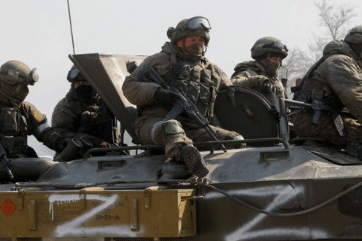 |
In the NewsApril 25, 2022Is Russia failing in its fight In Ukraine?Sue O'ConnellNECNCarol Saivetz, a senior advisor in the MIT Security Studies Program, provides an update on the state of the war as the US promises more aid for war-torn Ukraine. |
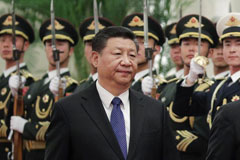 |
In the NewsApril 20, 2022China looks to learn from Russian failures in UkraineDavid RisingAssociated Press (AP)Quoted: “The big question Xi and the PLA leadership must be asking in light of Russian operations in Ukraine is whether a military that has undergone extensive reform and modernization will be able to execute operations that are far more complex than those Russia has undertaken during its invasion of Ukraine,” said M Taylor Fravel, director of the security studies program at the Massachusetts Institute of Technology. |
 |
In the NewsApril 5, 2022What Russia’s invasion of Ukraine means for the worldRussia’s invasion of Ukraine has global implications. A panel of MIT foreign policy experts convened on Monday to examine those reverberations—on European domestic politics, the refugee crisis, great-power relations, and nuclear security. |
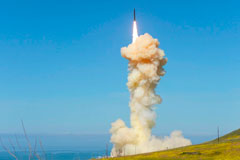 |
In the NewsApril 5, 2022US, UK and Australia announce expanded cooperation on hypersonicsEllen Nakashima and Cate Cadell The Washington PostQuoted: “It demonstrates in no uncertain terms that AUKUS is as much about advanced capabilities, as it is about submarines,” said M Taylor Fravel, director of the Security Studies Program at the Massachusetts Institute of Technology. “In fact, cooperation in these advanced capabilities are going to be more important in the short to medium term.” |
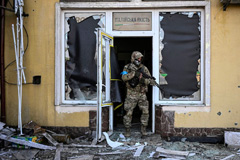 |
In the NewsApril 4, 2022Street-fighting insurgency gives Ukrainians a slight edgeJames A WarrenDaily BeastQuoted: Barry Posen, a renowned strategic studies scholar at MIT, gives this granular picture of the grim tactical realities of fighting in cities today: “Buildings provide high levels of protection and concealment for infantry soldiers. Multi-storied buildings, with basements, permit defenders to maneuver in a third dimension. Modern cities also have elaborate sewer systems, and often underground tunnels for transit systems. Thus, defenders may maneuver laterally, entirely out of sight of the attacker...” |
 |
In the NewsApril 3, 2022Cold War 2.0 has already begun — and it's going to be even scarier than the first oneMattathias SchwartzBusiness InsiderQuoted: Richard Samuels says the nuclear logic in a multipolar world means that more countries may feel they need nukes of their own. Abe Shinzo, the former prime minister of Japan, recently suggested that Tokyo consider nuclear sharing with the US, modeled on NATO arrangements. "Cold War 2.0 is likely to become a more-proliferated world," Samuels told me. "Some countries, referred to as 'latent nuclear powers,' are close to getting their own nuclear capability. But the view that having nuclear weapons makes for a stable world assumes rationality. Right now, we're watching a person some call crazy threaten the use of nuclear weapons. No wonder insecurity is soaring." |
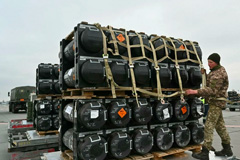 |
In the NewsApril 3, 2022US defense contractors see longer term benefits from war in UkraineAFPQuoted: Eric Heginbotham, a researcher at the MIT Center for International Studies, said that for Western governments -- as has been the case for years in Asia -- “there will be much less appetite for decreases” in military spending...“Countries are going to be looking to increase interoperability with the United States, which is really sort of the central pillar in NATO,” said Heginbotham. |
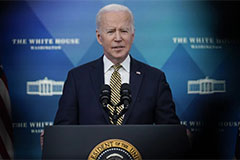 |
In the NewsMarch 25, 2022After Biden's warning, how might Russian cyberattacks play out in the US?Hiawatha BrayBoston GlobeJoel Brenner, senior research fellow at CIS and former head of counterintelligence for the US director of national intelligence, said that US cyber spies have penetrated Russian hacker networks, and often have a fair idea of what they're up to. |
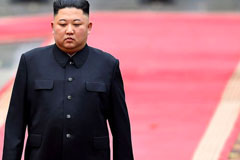 |
In the NewsMarch 25, 2022Biden's plan to 'secure N Korea nukes' as Kim's new missile puts US mainland 'in reach’Callum HoareExpressQuoted: Vipin Narang, a North Korea nuclear specialist at MIT, sent a warning about the possibility of provoking World War 3 if the plan is rolled out. He said: “The million-dollar question is: When do you invoke the OPLAN and what indicators do you rely on to do so? Because one country's`securing the country´operation can look to the other nation like an invasion plan. And then, all hell can break loose.” |
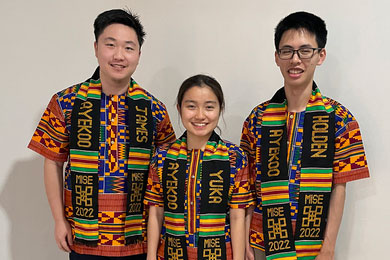 |
In the NewsMarch 25, 2022Traveling the world to make a global impactAnna-Rose StemberMISTIFor decades, MIT students have traveled abroad over Independent Activities Period (IAP) or in the summer for enriching global experiences through MIT International Science and Technology Initiatives (MISTI). This year, dozens of students became MISTI’s first IAP travelers abroad since the start of the pandemic. |
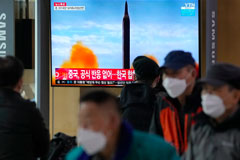 |
In the NewsMarch 24, 2022With US focus on Ukraine, North Korea launches a powerful new ICBMChoe Sang-HunThe New York TimesQuoted: North Korea is the first United States adversary since the Cold War to test both an ICBM and a claimed hydrogen bomb, according to Vipin Narang, an expert on nuclear proliferation at MIT. |
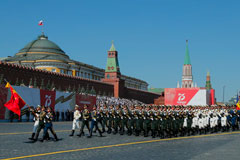 |
In the NewsMarch 21, 2022China and Russia’s military relationship likely to deepen with Ukraine warChristian ShepherdThe Washington PostQuoted: These constraints suggest that “supplies are mostly likely in the short term — if Beijing makes the strategic decision to move even closer to Moscow,” said M Taylor Fravel, director of the Security Studies Program at the Massachusetts Institute of Technology. |
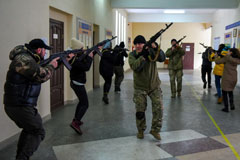 |
In the NewsMarch 18, 2022The false promise of arming insurgentsLindsey O'RourkeForeign AffairsQuoted: As the political scientist Barry Posen has pointed out, “The flat and open terrain in Ukraine is largely unfavorable to guerrilla warfare. This is particularly true in southeastern Ukraine, where Russian aggression seems most likely, given the lack of mountains, forests, or swamps for insurgents to use as base camps.” |
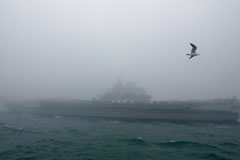 |
In the NewsMarch 9, 2022Ukraine helped build China’s modern military, but when war came, Beijing chose RussiaEva Dou and Pei Lin Wu The Washington PostQuoted: “Russia is far and away the most important arms supplier to China,” said M Taylor Fravel, the director of the security studies program at the Massachusetts Institute of Technology. “Where Ukraine has really helped China has been in the area of jet engines, as well as some ship engines and air-to-air missiles.” |
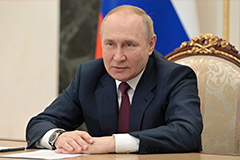 |
In the NewsMarch 8, 2022You should be scaredAndrian KreyeFeuilletonHow do we respond to dystopian images and messages in the news? Roger Petersen contributes his analysis on the war in Ukraine and the weapon of fear. |
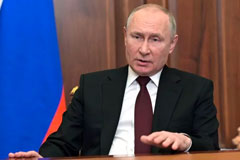 |
In the NewsMarch 6, 2022Nuclear fears intensify as Ukraine war builds. What is Putin's threshold?Fred GuterlNewsweekQuoted: “If the Russian campaign starts to feel like it's a military catastrophe, that's where escalation to nuclear weapons comes into play,” says Barry Posen, Ford International Professor of Political Science at MIT....“I don't like the discussions I'm hearing from the fringes of the establishment,” says Posen. “I don't like the emotions running hot. I don't like the weird appearance on our side, way too early, of a kind of victory disease: ‘Let's win this thing. Maybe Putin will fall’.” |
 |
In the NewsMarch 4, 2022Q&A: Climate Grand Challenges finalists on building equity and fairness into climate solutionsMIT News OfficeA team led by Evan Lieberman, professor of political science and director of the MIT Global Diversity Lab and MIT International Science and Technology Initiatives, Danielle Wood, assistant professor in the Program in Media Arts and Sciences and the Department of Aeronautics and Astronautics, and Siqi Zheng, professor of urban and real estate sustainability in the Center for Real Estate and the Department of Urban Studies and Planning, is seeking to reduce ethnic and racial group-based disparities in the capacity of urban communities to adapt to the changing climate. |
 |
In the NewsMarch 3, 20223 Questions: Fotini Christia on racial equity and data scienceInstitute for Data, Systems, and SocietyMIT NewsA new MIT-wide effort launched by the Institute for Data, Systems, and Society uses social science and computation to address systemic racism. |
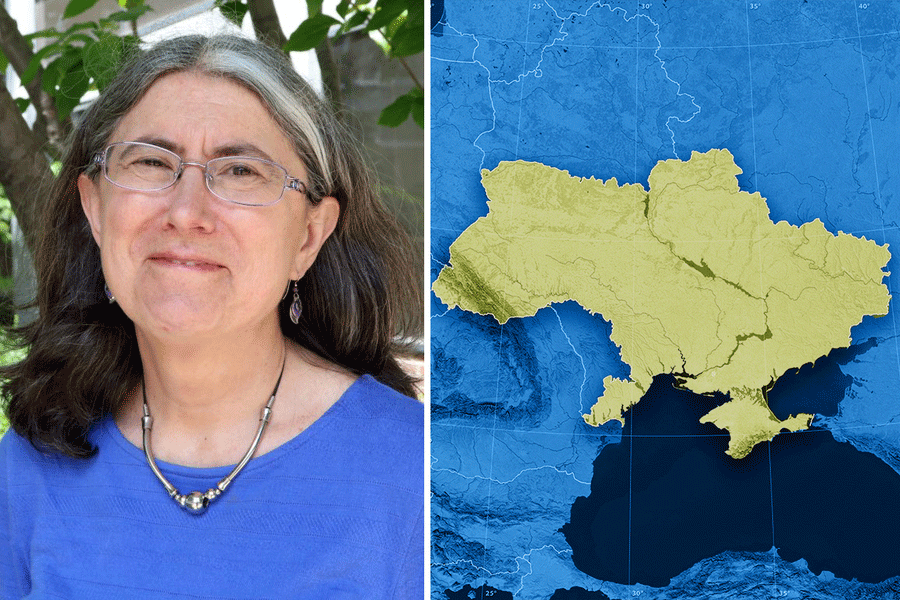 |
In the NewsMarch 2, 2022Q&A: Elizabeth Wood on Russia’s invasion of UkraineMIT News asked Elizabeth Wood, professor of history at MIT and author of the 2016 book “Roots of Russia’s War in Ukraine” (published by the Woodrow Wilson Center and Columbia University Press), to evaluate the situation, as of the beginning of March, slightly less than a week after the invasion began. |
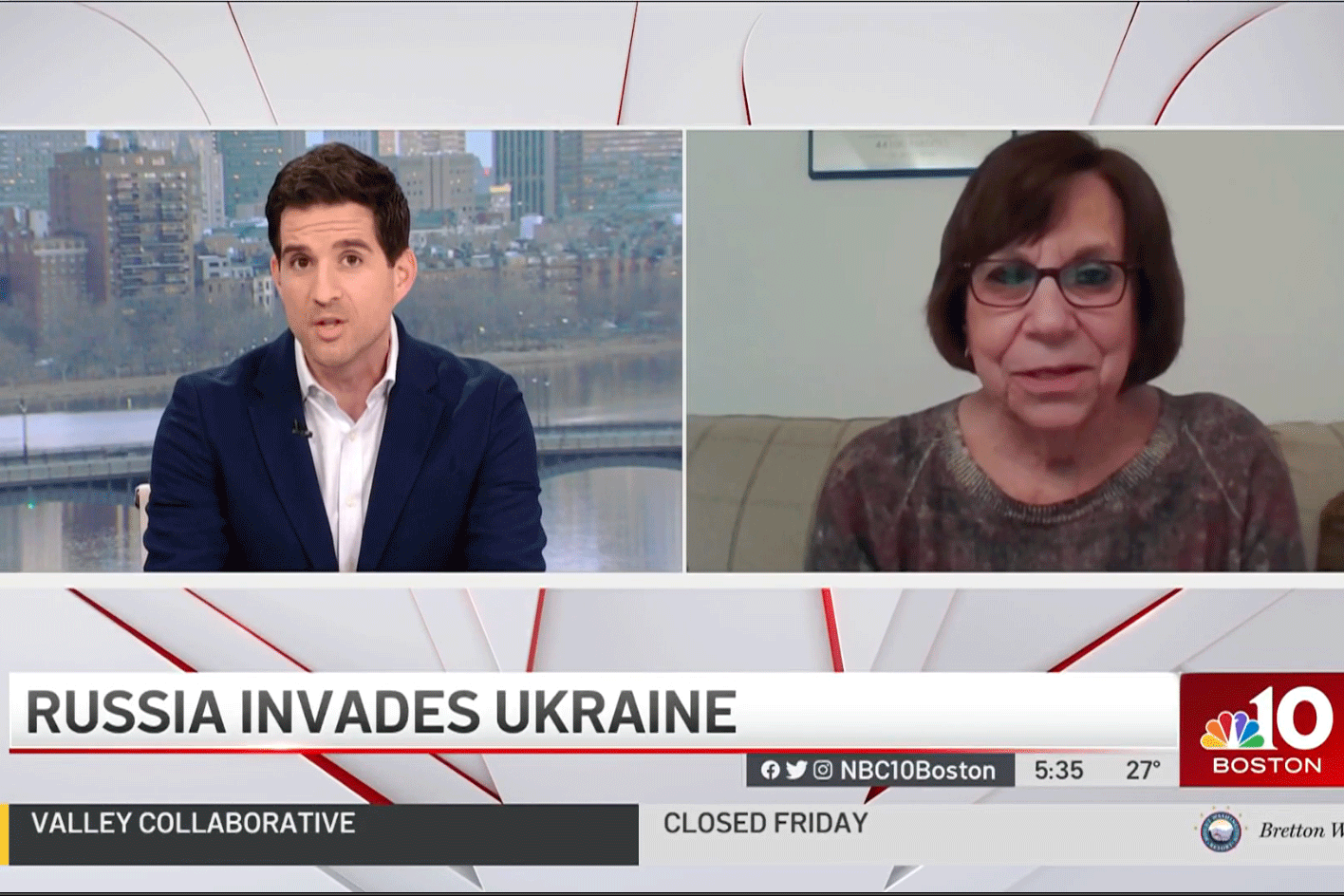 |
In the NewsFebruary 24, 2022What are the implications of the Russian attack on Ukraine?10 BostonCarol Saivetz discusses the Russian attacks in Ukraine and the international community’s response.
|
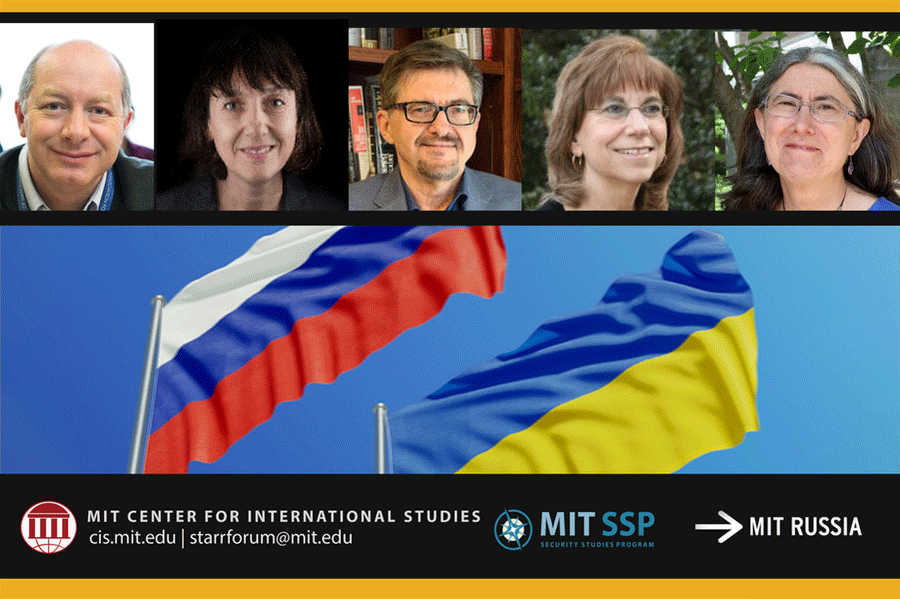 |
In the NewsFebruary 4, 2022Is an armed conflict imminent?Peter DizikesMIT NewsAs Russia masses military equipment near Ukraine borders, experts in an MIT Starr Forum express concern about possible action and its consequences. |
 |
In the NewsFebruary 2, 20223Q: Women’s rights and rising threats to press freedom worldwideMichelle EnglishMIT NewsPolish journalist Ada Petriczko, an Elizabeth Neuffer Fellow at CIS, discusses ethical and cross-border journalism, freedom of speech, and the rise of autocracy. |
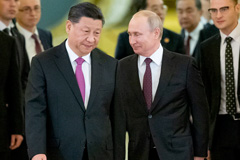 |
In the NewsFebruary 1, 2022As Putin heads to Beijing, Russia and China’s stronger ties are a headache for the USEva Dou and Mary Ilyushina The Washington PostQuoted: But M Taylor Fravel, director of the security studies program at MIT, said there are also risks for China in a Ukraine war, so Russia shouldn’t count too much on Beijing’s support. China buys a significant amount of military equipment from Ukraine and would be caught in the middle, he said. “China has been willing to a point to try to provide diplomatic support for Russia,” Fravel said. “But China doesn’t want to see armed conflict erupt.” |
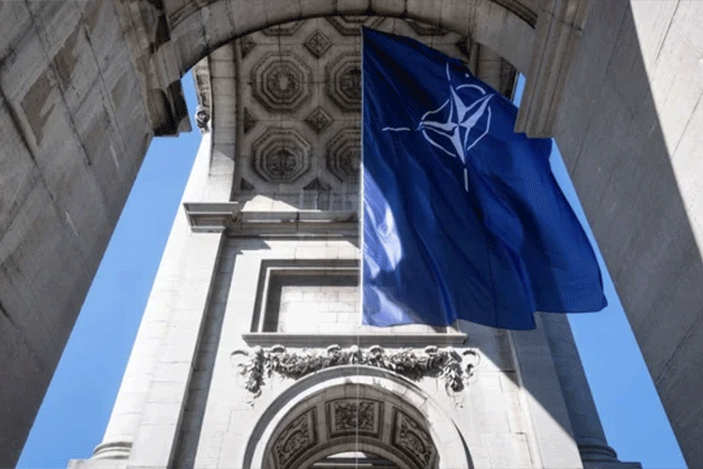 |
In the NewsJanuary 27, 2022There is no NATO open-door policyMichael O'Hanlon and Stephen Van EveraThe HillIn the current crisis involving Russia, Ukraine and Western countries, it is often asserted that because the NATO alliance has an “open-door” policy, Ukraine must retain its right to join the alliance someday. That is incorrect. |
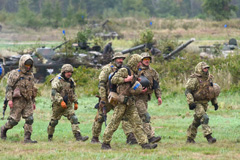 |
In the NewsJanuary 27, 2022How America’s NATO expansion obsession plays into the Ukraine crisisJonathan GuyerVoxQuoted: In the early ’90s, that generation of national security operatives weren’t prepared to forfeit leverage in Europe. “NATO had to find something to do or go out of business, and these people who grew up all their lives alongside it would not let it go out of business,” said Barry Posen, a political scientist at MIT. |
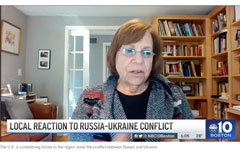 |
In the NewsJanuary 24, 2022Ukrainian family in Boston hoping for de-escalation of conflict with RussiaBianca BeltranNBC 10 BostonQuoted: “Putin has upped the ante,” said Carol Saivetz, senior advisor in the MIT Security Studies Program. “We are signaling to the Russians that we are very serious about this by talking about deploying troops in the Baltic states.” Saivetz thinks despite the show of force, none of the countries involved want to engage in a land war. “The question is, ‘How can you use diplomacy?’ Can you turn the screws enough so that he will say, ‘OK, I've got what I needed, where is the off ramp here?’” she said. |
 |
In the NewsJanuary 19, 2022China plays the waiting game on the Russia-Ukraine crisisChina Note-TakerWorld Politics ReviewQuoted: China is hoping to “strike a balance in its relationship with Russia and the United States by not taking a clear public position that might antagonize one or the other,” Fravel, who is the director of the Security Studies Program at MIT, told World Politics Review. Beijing’s reticence to make bold pronouncements also reflects its lack of a clear policy framework to deal with the crisis, given its conflicting interests, Fravel added. |
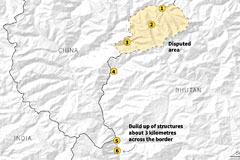 |
In the NewsJanuary 12, 2022China steps up construction along disputed Bhutan borderDevjyot Ghoshal, Anand Katakam and Aditi BhandariReutersQuoted: The settlements appear part of a plan Beijing made public in 2017 to build more than 600 villages in border areas in the Tibet Autonomous Region (TAR), which lies on the Chinese side of the disputed border, said Barnett and M Taylor Fravel, director of the Security Studies Program at the Massachusetts Institute of Technology. Fravel said the construction indicated China likely wanted to consolidate its control and improve infrastructure in border areas. |
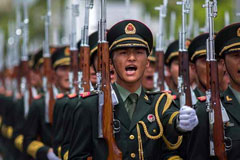 |
In the NewsJanuary 11, 2022Chinese army begins 2022 training programANIQuoted: M Taylor Fravel, Director of the Security Studies Program at MIT, noted several interesting points about the 2022 order. One noteworthy thing is that the text was quite personalized, with Xi saying, “I command...” The personal pronoun “I” was used in 2018, but not in subsequent ones... Fravel noted, “Unlike previous orders, this year's order lacked no details about the goals for PLA training. These goals often identify what the PLA views to be obstacles/shortcomings to be sumounted and to ‘unify thought’ around these goals to improve capabilities. Instead this yar's order only contained a general exhortation to train elite troops and uphold a spirit of not fearing hardship or death.” |
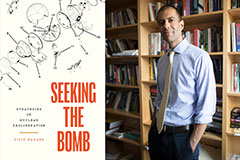 |
In the NewsJanuary 11, 2022A look at how countries go nuclear—and why some do notPeter DizikesMIT NewsIn his new book, “Seeking the Bomb,” Vipin Narang looks at the variety of tactics countries use as they attempt to acquire nuclear weapons. |
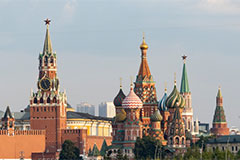 |
In the NewsJanuary 10, 2022Where things stand between the US and RussiaNECNMonday the US and Russia kicked off security talks, in an effort to defuse soaring tensions over Russia’s military buildup on its border with Ukraine. Sue O’Connell spoke with Carol Saivetz, a senior advisor for the Security Studies Program at MIT. |
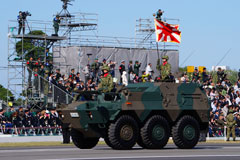 |
In the NewsJanuary 3, 2022Does Japan aspire to be a superpower?Alec DubroForeign Policy in Focus (FPIF)Quoted: But a huge defense budget alone is not a reliable measure of power, according to Richard Samuels, director of MIT’s Japan Program and of its Center for International Studies. Said Samuels, “Japan is unlikely to be ever be able to deter China on its own (short of nuclear breakout), and is therefore being diligent in hugging the US and cultivating relations with other countries in the region—and, you will have noticed, in Europe as well.” |


